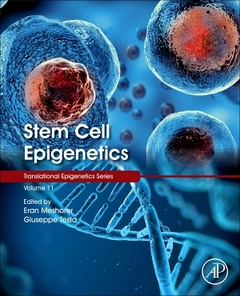Description
Stem Cell Epigenetics
Translational Epigenetics Series
Language: English
Keywords
epigenetics; epigenomics; chromatin in pluripotency; epigenetic regulation of reprogramming; stem cells; DNA methylation; histone modifications; higher-order chromatin conformation; pluripotent cells; epigenetics and disease modelling; organoids from pluripotent cells; transcriptional regulation in stem cells; non-coding RNAs; stem cell epigenetics for drug discovery
318 p. · 19x23.3 cm · Hardback
Description
/li>Contents
/li>Readership
/li>Comment
/li>
2. Stem cell epigenomics
3. A change in culture; modelling human germ cell development in vitro
4. Higher order chromatin structure
5. Polycomb
6. Mitotic bookmarking by transcription factors and the preservation of pluripotency
7. Roles and regulation of endogenous retroviruses in pluripotency and early development
8. Single stem cell biology
9. Stem cell chromatin plasticity
10. Transcriptional and epigenetic regulatory mechanisms in glioblastoma
11. 3D Models of the Human Brain
12. Stem cell epigenetic proteomics
Researchers, clinicians and graduate students in genomic medicine, epigenetics, stem cell epigenetics, and stem cell biology
- Analyzes the role of epigenetics in embryonic stem cell regulation
- Indicates the epigenetic mechanisms involved in stem cell differentiation and highlights modifications and misregulations that may result in disease pathogenesis
- Examines the potential applications of stem cell epigenetics in therapeutic disease interventions and regenerative medicine, providing a foundation for researchers and physicians to bring this exciting and fast-evolving field into a clinical setting
- Features chapter contributions by leading international experts




